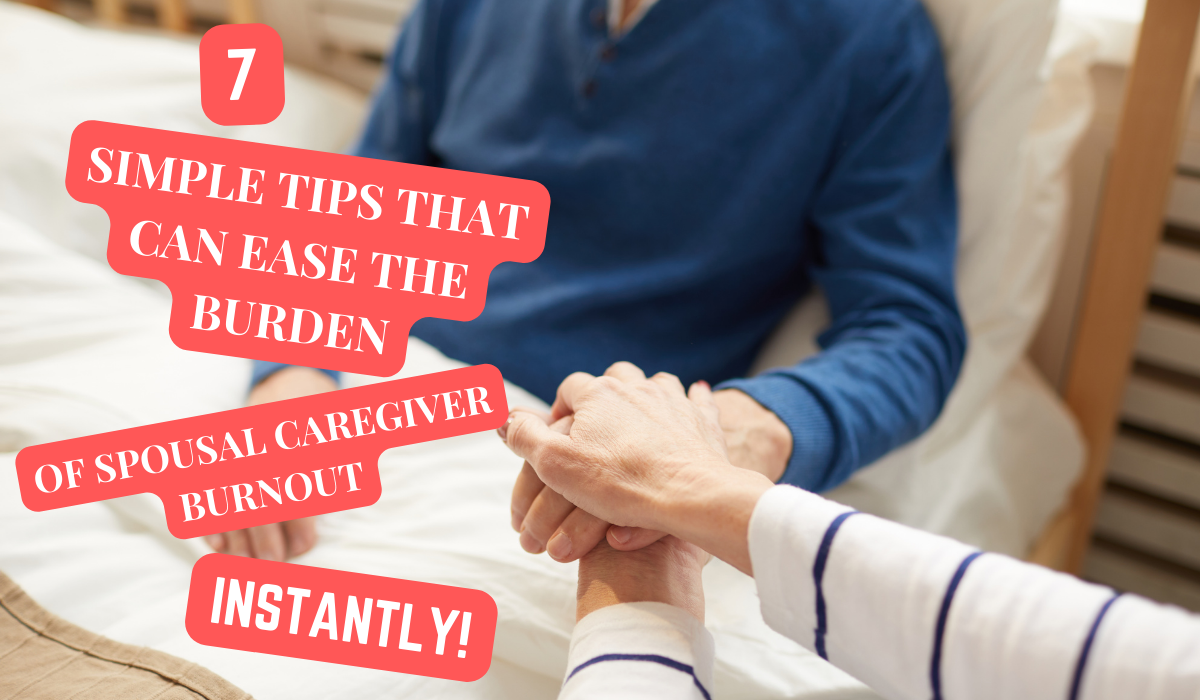
INTRODUCTION – SPOUSAL CAREGIVER BURNOUT:
In recent years, there has been a growing dependence on family caregivers, often untrained, to support seriously ill older adults with personal care and household tasks in their final years. Spouses, who frequently assume these responsibilities alone, are especially at risk. Many of them are elderly, in poor health, and must cope with the emotional and financial burdens of their spouse’s impending death. Assessing caregiver burnout and supporting these family caregivers of individuals with serious illnesses is vital. Ultimately, this necessitates a shift in care focus of severe illnesses from the patient to the entire family unit.
I have found a study by Ornstein, Wolff, Bolen’s-Lund, Rahman, and Kelly (2019), “Spousal Caregivers Are Caregiving Alone In The Last Years of Life,” really useful and interesting. It also backs up this theory that the shift in focus should include the entire family unit, particularly the spouse, who is usually the main caregiver.

WHAT IS CAREGIVER BURNOUT?
Caregiver burnout is a state of physical, emotional, and mental exhaustion that can occur when caregivers don’t get the help they need, or if they try to do more than they are able either physically or financially. Often, caregivers feel overwhelmed by the demands of caring for a loved one and neglect their own well-being, leading to a depletion of energy, anxiety, and even depression. Symptoms of caregiver burnout can include feelings of irritability, fatigue, problems with sleep, weight fluctuations, and feelings of helplessness or hopelessness. As caregivers push themselves to meet the needs of others, they may struggle with feelings of isolation, a reduced sense of personal achievement, or a loss of identity.
An elderly client once came to me grappling with anxiety and depression. She was the sole caregiver for her husband, who was battling dementia. Committed to honouring her husband’s wish to avoid a nursing home, she was determined to care for him at home. Despite her dedication, she felt increasingly stressed, exhausted, and isolated as the demands of caregiving weighed heavily on her.
Indeed, this lady was experiencing caregiver burnout, a condition marked by overwhelming stress and fatigue that arises from the unrelenting demands of caregiving without adequate support or respite. Her dedication to her husband’s wishes, coupled with her role as his sole caregiver, left her feeling exhausted and alone, classic symptoms of this distressing state.

WHAT ARE THE SIGNS AND SYMPTOMS OF SPOUSAL CAREGIVER BURNOUT?
Spousal caregiver burnout involves a range of signs and symptoms that can affect physical health, emotional stability, and overall well-being. Here are some of the key indicators:
- Emotional Exhaustion: Spousal caregivers may feel drained, unable to cope, and emotionally depleted. They often experience sadness, irritability, or numbness, finding little joy or satisfaction in caregiving or other aspects of life.
- Physical Fatigue: Physical symptoms such as constant tiredness, sleep disturbances (either insomnia or oversleeping), and changes in appetite (loss of appetite or overeating) are common. Neglecting one’s own medical needs might also lead to a decline in personal health.
- Increased Anxiety or Depression: Caregivers may feel persistent sadness, hopelessness, or helplessness. Anxiety can also manifest as constant worry about the future, especially about what will happen if their caregiving abilities diminish or if the spouse’s condition worsens.
- Decreased Immunity: High stress levels can weaken immune responses, making caregivers more susceptible to infections and illnesses.
- Isolation and Withdrawal: Feeling overwhelmed can lead caregivers to withdraw from friends, family, and activities they once enjoyed, further increasing feelings of isolation and loneliness.
- Cognitive Impairment: Stress and fatigue can impair concentration, focus, and memory, making daily tasks and decision-making more difficult.
- Emotional Outbursts: The constant pressure can lead to unexpected emotional responses, such as outbursts of anger or frustration, often over minor issues.
- Loss of Interest in Personal Care: A decline in personal hygiene or grooming can occur because the caregiver devotes less time and energy to their care.
Recognising these signs is crucial for addressing caregiver burnout effectively. Fortunately, my client reached out to a good friend, who advised her that she needed extra support.
FACTORS THAT AFFECT RECOVERY TIME FOR SPOUSAL CAREGIVER BURNOUT.
Recovery time from spousal caregiver burnout can vary widely depending on several key factors:
- Severity of Burnout: The intensity and duration of burnout before intervention can significantly impact recovery time. In more severe cases, where the caregiver has been neglecting their own needs for an extended period, recovery may take longer.
- Availability of Support: Access to emotional and practical support plays a critical role in recovery. This support can come from family, friends, support groups, or professional services. Having someone to share caregiving duties with, or just having a reliable emotional outlet, can greatly accelerate recovery.
- Health of the Caregiver: The physical and mental health status of the caregiver before and during burnout affects how quickly they can recuperate. Pre-existing conditions, such as chronic illnesses or mental health issues, may slow down the recovery process.
- Quality and Quantity of Respite Care: Regular breaks or respite care allow caregivers time to rest and engage in self-care. The availability and quality of these breaks, whether it’s through professional caregiving help or informal family support, are vital for allowing caregivers time to recharge.
- Coping Strategies and Skills: The effectiveness of a caregiver’s coping mechanisms, such as stress management techniques and problem-solving skills, influences recovery. Caregivers who have or develop strong coping strategies typically recover faster.
- The Care Recipient’s Condition: Changes in the condition of the spouse receiving care can affect recovery. For instance, if the spouse’s health declines, it might increase the caregiving burden, thereby slowing the caregiver’s recovery. Conversely, improvements in the spouse’s condition can alleviate some of the caregiver’s stress.
- Financial Resources: Economic stability can ease the stress associated with caregiving. The ability to afford additional help or medical care for the spouse can reduce the burden on the caregiver, facilitating a quicker recovery.
- Personal Motivation and Outlook: A caregiver’s resilience and outlook toward caregiving and life can influence recovery time. Those with a positive, proactive approach may find it easier to seek help and adapt to challenges, recovering more quickly.
Addressing these factors through targeted support and interventions can help manage and potentially reduce the duration of spousal caregiver burnout.

ACKNOWLEDGING THE NEED FOR RECOVERY FROM SPOUSAL CAREGIVER BURNOUT.
Thankfully, my client realised that self-care is not just beneficial; it’s necessary, especially when coping with spousal caregiver burnout.
The following are some more encouraging points regarding the importance of self-care.
- Refuel to Give Better Care: Just as you’re advised on aeroplanes to put on your oxygen mask before helping others, taking care of yourself allows you to be a better caregiver in caregiving. When you are well-rested, healthy, and emotionally balanced, you can provide high-quality care, make thoughtful decisions, and stay patient and compassionate.
- Preserve Your Health: I reminded my client that their health is a priority. Neglecting self-care can lead to serious physical and mental health issues. Regular check-ups, a balanced diet, exercise, and adequate sleep are crucial for maintaining strength and well-being.
- Mental Resilience: Self-care includes cognitive and emotional wellness. Activities like mindfulness, meditation, journaling, or speaking with a therapist can significantly reduce stress levels and prevent feelings of depression and anxiety. This mental resilience helps manage the emotional demands of caregiving.
- Sustain Relationships: I encouraged my client to maintain social connections outside her caregiving responsibilities. Socialising can provide emotional support, reduce feelings of isolation, and offer fresh perspectives on their challenges. Maintaining these relationships keeps their social skills and emotional health intact.
- Enjoy Personal Interests: Engaging in hobbies or interests that bring joy can be a powerful antidote to burnout. Whether reading, gardening, crafting, or any other activity they love, spending time on these can rejuvenate their spirit and bring much-needed pleasure and relaxation.
- Set Boundaries: I encouraged this client to set boundaries, which prevented them from becoming overwhelmed and helped them manage the expectations of those around them.
- Seek and Accept Help: I assured my client that seeking help is a sign of strength, not weakness. Utilising resources such as respite care, professional caregivers, or support from family and friends can provide crucial breaks and reduce the caregiving load.

CONCLUSION – SPOUSAL CAREGIVER BURNOUT
Through counselling, this client experienced significant benefits that have helped her manage the challenges of spousal caregiver burnout. The supportive counselling environment provided them a safe space to express their feelings, fears, and frustrations without judgment. This validation of their emotions is crucial, as it often allows for a sense of relief and understanding that they are not alone in their struggles.
https://lindamcowan.com/30-days-to-reduce-anxiety
DISCLAIMER
The information on Linda M Cowan’s Blog is only intended for educational and informational purposes. It is not meant to replace professional psychological or psychiatric advice, diagnosis, or treatment.
If you are experiencing a mental health crisis, or if you think you may have a medical emergency, don’t hesitate to get in touch with your healthcare provider or go to the nearest hospital emergency department.



